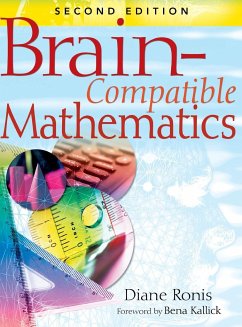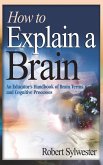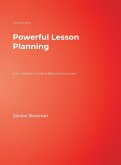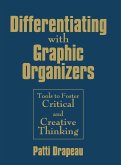Diane Ronis
Brain-Compatible Mathematics
Diane Ronis
Brain-Compatible Mathematics
- Gebundenes Buch
- Merkliste
- Auf die Merkliste
- Bewerten Bewerten
- Teilen
- Produkt teilen
- Produkterinnerung
- Produkterinnerung
Build upon a student's neural wiring for learning with this second edition of a powerful bestseller that bridges the world of brain research with improved mathematics instruction.
Andere Kunden interessierten sich auch für
![How to Explain a Brain How to Explain a Brain]() Robert SylwesterHow to Explain a Brain67,99 €
Robert SylwesterHow to Explain a Brain67,99 €![Being Mentored Being Mentored]() Hal PortnerBeing Mentored42,99 €
Hal PortnerBeing Mentored42,99 €![Secrets to Success for Social Studies Teachers Secrets to Success for Social Studies Teachers]() Ellen KottlerSecrets to Success for Social Studies Teachers74,99 €
Ellen KottlerSecrets to Success for Social Studies Teachers74,99 €![Powerful Lesson Planning Powerful Lesson Planning]() Janice SkowronPowerful Lesson Planning71,99 €
Janice SkowronPowerful Lesson Planning71,99 €![Differentiating With Graphic Organizers Differentiating With Graphic Organizers]() Patti DrapeauDifferentiating With Graphic Organizers72,99 €
Patti DrapeauDifferentiating With Graphic Organizers72,99 €![Making Physics Fun Making Physics Fun]() Robert PrigoMaking Physics Fun67,99 €
Robert PrigoMaking Physics Fun67,99 €![What Teachers Should Know But Textbooks Don't Show What Teachers Should Know But Textbooks Don't Show]() Stella ErbesWhat Teachers Should Know But Textbooks Don't Show53,99 €
Stella ErbesWhat Teachers Should Know But Textbooks Don't Show53,99 €-
-
-
Build upon a student's neural wiring for learning with this second edition of a powerful bestseller that bridges the world of brain research with improved mathematics instruction.
Produktdetails
- Produktdetails
- Verlag: Corwin
- 2. Auflage
- Seitenzahl: 98
- Erscheinungstermin: 26. September 2006
- Englisch
- Abmessung: 286mm x 221mm x 10mm
- Gewicht: 529g
- ISBN-13: 9781412939379
- ISBN-10: 1412939372
- Artikelnr.: 21527335
- Herstellerkennzeichnung
- Libri GmbH
- Europaallee 1
- 36244 Bad Hersfeld
- gpsr@libri.de
- Verlag: Corwin
- 2. Auflage
- Seitenzahl: 98
- Erscheinungstermin: 26. September 2006
- Englisch
- Abmessung: 286mm x 221mm x 10mm
- Gewicht: 529g
- ISBN-13: 9781412939379
- ISBN-10: 1412939372
- Artikelnr.: 21527335
- Herstellerkennzeichnung
- Libri GmbH
- Europaallee 1
- 36244 Bad Hersfeld
- gpsr@libri.de
Diane Ronis is a professor of education at Southern Connecticut State University and has a Ph.D. in curriculum and instruction. Her drive to make learning meaningful to all students comes from 17 years of teaching middle school and high school mathematics and fine arts as well as eight years of experience instructing preservice teachers at the college and graduate level. Ronis has been a presenter and keynote speaker at numerous conferences, workshops and seminars, and is the author of Brain Compatible Mathematics, Brain Compatible Assessments, Critical Thinking in Math, Problem Based Learning for Math & Science: Integrating Inquiry and the Internet, and Clustering Standards in Integrated Units.
Foreword
Preface
Publisher¿s Acknowledgements
Introduction
About the Author
1. Performance-Based Learning and Assessment
Traditional Versus Brain-Friendly Assessments
Importance of Performance Assessment
Alignment of Curriculum and Assessment
Assessment as Continuous Monitoring
Assessment as Tool for Learning
Grades K-2 Units
2. The Six Pillars of Performance Task Development
Set Up Clear Performance Goals
Employ "Authentic" Project Tasks
Teach and Emphasize Criteria Levels and Performance Standards
Provide Models and Demonstrations of Excellence
Teach Strategies Explicitly
Use Ongoing Assessments for Feedback and Adjustments
Brain-Compatible Framework
Grades 3-5 Units
3. Multiple Intelligences and Brain-Compatible Learning
Theory of Multiple Intelligences
Multiple Intelligences Model
Assessment for Multiple Intelligences
Grades 6-8 Units
4. Performance-Based Instructional Strategies
Cooperative Learning
Writing and Communicating in the Classroom
Classroom Practice
Challenge Project Unit
5. Problem-Solving Strategies
Instructional Strategies
Problem Exploration
Heuristics
Study Skills, Thinking Skills, and Thinking Processes
Mnemonic Techniques
Organizational Strategies
Patterning
Challenge Project Unit
6. Teaching and Assessing With the Rubric
Scoring Rubrics
Categories for Rubrics
Types of Rubrics
Brain-Compatible Assessment
Challenge Project Unit
7. Teaching and Assessing With the Portfolio
Student Evaluations
Portfolio Assessment
A Portfolio System
Conclusion
Principles and Standards for School Mathematics
Glossary
Resources
Bibliography
Index
Preface
Publisher¿s Acknowledgements
Introduction
About the Author
1. Performance-Based Learning and Assessment
Traditional Versus Brain-Friendly Assessments
Importance of Performance Assessment
Alignment of Curriculum and Assessment
Assessment as Continuous Monitoring
Assessment as Tool for Learning
Grades K-2 Units
2. The Six Pillars of Performance Task Development
Set Up Clear Performance Goals
Employ "Authentic" Project Tasks
Teach and Emphasize Criteria Levels and Performance Standards
Provide Models and Demonstrations of Excellence
Teach Strategies Explicitly
Use Ongoing Assessments for Feedback and Adjustments
Brain-Compatible Framework
Grades 3-5 Units
3. Multiple Intelligences and Brain-Compatible Learning
Theory of Multiple Intelligences
Multiple Intelligences Model
Assessment for Multiple Intelligences
Grades 6-8 Units
4. Performance-Based Instructional Strategies
Cooperative Learning
Writing and Communicating in the Classroom
Classroom Practice
Challenge Project Unit
5. Problem-Solving Strategies
Instructional Strategies
Problem Exploration
Heuristics
Study Skills, Thinking Skills, and Thinking Processes
Mnemonic Techniques
Organizational Strategies
Patterning
Challenge Project Unit
6. Teaching and Assessing With the Rubric
Scoring Rubrics
Categories for Rubrics
Types of Rubrics
Brain-Compatible Assessment
Challenge Project Unit
7. Teaching and Assessing With the Portfolio
Student Evaluations
Portfolio Assessment
A Portfolio System
Conclusion
Principles and Standards for School Mathematics
Glossary
Resources
Bibliography
Index
Foreword
Preface
Publisher¿s Acknowledgements
Introduction
About the Author
1. Performance-Based Learning and Assessment
Traditional Versus Brain-Friendly Assessments
Importance of Performance Assessment
Alignment of Curriculum and Assessment
Assessment as Continuous Monitoring
Assessment as Tool for Learning
Grades K-2 Units
2. The Six Pillars of Performance Task Development
Set Up Clear Performance Goals
Employ "Authentic" Project Tasks
Teach and Emphasize Criteria Levels and Performance Standards
Provide Models and Demonstrations of Excellence
Teach Strategies Explicitly
Use Ongoing Assessments for Feedback and Adjustments
Brain-Compatible Framework
Grades 3-5 Units
3. Multiple Intelligences and Brain-Compatible Learning
Theory of Multiple Intelligences
Multiple Intelligences Model
Assessment for Multiple Intelligences
Grades 6-8 Units
4. Performance-Based Instructional Strategies
Cooperative Learning
Writing and Communicating in the Classroom
Classroom Practice
Challenge Project Unit
5. Problem-Solving Strategies
Instructional Strategies
Problem Exploration
Heuristics
Study Skills, Thinking Skills, and Thinking Processes
Mnemonic Techniques
Organizational Strategies
Patterning
Challenge Project Unit
6. Teaching and Assessing With the Rubric
Scoring Rubrics
Categories for Rubrics
Types of Rubrics
Brain-Compatible Assessment
Challenge Project Unit
7. Teaching and Assessing With the Portfolio
Student Evaluations
Portfolio Assessment
A Portfolio System
Conclusion
Principles and Standards for School Mathematics
Glossary
Resources
Bibliography
Index
Preface
Publisher¿s Acknowledgements
Introduction
About the Author
1. Performance-Based Learning and Assessment
Traditional Versus Brain-Friendly Assessments
Importance of Performance Assessment
Alignment of Curriculum and Assessment
Assessment as Continuous Monitoring
Assessment as Tool for Learning
Grades K-2 Units
2. The Six Pillars of Performance Task Development
Set Up Clear Performance Goals
Employ "Authentic" Project Tasks
Teach and Emphasize Criteria Levels and Performance Standards
Provide Models and Demonstrations of Excellence
Teach Strategies Explicitly
Use Ongoing Assessments for Feedback and Adjustments
Brain-Compatible Framework
Grades 3-5 Units
3. Multiple Intelligences and Brain-Compatible Learning
Theory of Multiple Intelligences
Multiple Intelligences Model
Assessment for Multiple Intelligences
Grades 6-8 Units
4. Performance-Based Instructional Strategies
Cooperative Learning
Writing and Communicating in the Classroom
Classroom Practice
Challenge Project Unit
5. Problem-Solving Strategies
Instructional Strategies
Problem Exploration
Heuristics
Study Skills, Thinking Skills, and Thinking Processes
Mnemonic Techniques
Organizational Strategies
Patterning
Challenge Project Unit
6. Teaching and Assessing With the Rubric
Scoring Rubrics
Categories for Rubrics
Types of Rubrics
Brain-Compatible Assessment
Challenge Project Unit
7. Teaching and Assessing With the Portfolio
Student Evaluations
Portfolio Assessment
A Portfolio System
Conclusion
Principles and Standards for School Mathematics
Glossary
Resources
Bibliography
Index









